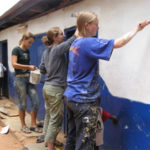4 Strong Virginia Tech Essay Examples by Accepted Students
Virginia Tech combines a wide range of academic offerings with a reputation for athletic excellence, a combination that many students find attractive. Since you’ll be competing against many other qualified students, you want to make sure your essays will set you apart from applicants who may have similar grades and extracurriculars.
In this post, we’ll break down four essays that helped real students gain acceptance to Virginia Tech. We’ll talk through what each essay did well, and any areas for improvement.
Please note: Looking at examples of real essays students have submitted to colleges can be very beneficial to get inspiration for your essays. You should never copy or plagiarize from these examples when writing your own essays. Colleges can tell when an essay isn’t genuine and will not view students favorably if they plagiarized.
Read our Virginia Tech essay breakdown to get a comprehensive overview of this year’s supplemental prompts.
Essay Example 1 – Leadership
“Sorry, I don’t have my lines memorized yet.” When I heard the phrase for the third time two weeks out from the first state high school theater competition, where my high school was entering a 30-minute version of Hamlet in the Klingon language, I knew I had to take charge.
Spending hours constructing a line-by-line guide to the script and seeking out the actors having trouble, I stepped beyond my roles as a mere translator and dialogue coach to tutor the cast. Rapidly learning my part, I aided other actors’ preparations during rehearsals as much as I practiced mine. Despite our third place finish, I discovered how to commit whatever’s necessary to ensure a good showing.
What the Essay Did Well
One of this essay’s primary strengths is its thoroughness. The prompt asks you to not only describe a particular situation, but also answer three specific questions related to it, all in less than 120 words. Being both comprehensive and efficient is far easier said than done, but this writer does an excellent job of striking that balance:
- The lines “I stepped beyond my roles as a mere translator and dialogue coach to tutor the cast” and “I aided other actors’ preparations” answer the prompt’s first two questions, by explaining which skills the writer contributed and how others relied on them for guidance
- The final line tells us what the writer learned about themselves, namely that they “discovered how to commit whatever’s necessary to ensure a good showing”
Additionally, the writer answers the questions in a way that isn’t heavy-handed. They trust that they have described the situation well enough that their point will be clear the first time, which means that they can keep things moving, rather than throwing a wrench in the flow of the story by spending a bunch of words hammering home a point that readers already understand.
The essay’s other biggest strength is its originality. While you don’t want to twist yourself into knots trying to pick a topic admissions officers have absolutely never seen before, as that’s practically impossible, you do want to tell a story that they haven’t heard a million times before.
Because not too many applicants have performed “a 30-minute version of Hamlet in the Klingon language,” we don’t just learn about the student’s leadership skills, but also get a more general idea of their personality, and what makes them different from other 18 year olds. Unfortunately, college applications are by their nature usually quite dry, so telling a more unusual story like this one can help humanize you more than a more “typical” response centered on, for example, volunteering as a tutor for middle schoolers.
That being said, honesty is crucial in the college essay, so if your most authentic response is about a more conventional topic, that’s completely fine! Just don’t be afraid to pick something unusual, if the opportunity presents itself.
What Could Be Improved
Overall, the writer makes great use of the space given to them. However, the last two lines aren’t as strong as the rest of the essay, and so things unfortunately end on a relative down note.
The line “Rapidly learning my part, I aided other actors’ preparations during rehearsals as much as I practiced mine,” doesn’t really teach us anything that isn’t already communicated by the previous sentence. And the line “Despite our third place finish, I discovered how to commit whatever’s necessary to ensure a good showing” is clear, but a pretty bland way of phrasing the essay’s final takeaway.
To keep momentum going through the finish, the first sentence could be rewritten to something more descriptive, so that we stay fully immersed in the story’s development. That might look something like: “By the time the curtains opened on the big day, our pronunciation was indistinguishable from Spock’s.”
Then, to make the final line more personal, the writer could more explicitly tie the takeaway to their story, with a something like “Despite our third place finish, to this day I smile whenever I think of my actors spending those extra hours with me, doing gymnastics with their tongues to try and master a particularly challenging vowel, all in the name of putting on a show we could be proud of.”
This version’s specificity makes the takeaway more personal to this particular student, and thus more impactful, rather than it just feeling like a variation of something cliché.
Essay Example 2 – Community, Scholastic Bowl Style
Despite having been a member of the Scholastic Bowl team since entering high school, even a year ago, I could contribute little more than an understanding of the sciences and esoteric medieval history. However, when I became one of the team’s senior members, I realized that wasn’t enough.
After working hard to ensure that my teammates can depend on me, I’ve learned to recognize figures as various as Rodin, Coltrane, and Hegel. During games, I’ve gained the confidence to step forward when it’s time to choose a captain and the experience needed to make quick decisions. At Virginia Tech, in the Academic Competition Organization, I will continue to use the skills I’ve acquired to bring those around me to victory.
What the Essay Did Well
In this “Community Service” essay, the student does an excellent job of concretely describing how they have grown through their involvement in Scholastic Bowl. We learn that they have gone from “contribut[ing] little more than an understanding of the sciences and esoteric medieval history” to “recogniz[ing] figures as various as Rodin, Coltrane, and Hegel,” which is a specific, engaging way of framing their development.
Additionally, the writer lists increased confidence and an ability to make quicker decisions as general skills that they have taken away from this experience. In any college essay, you want to make sure you don’t just tell your reader about something you did, but also show how the lessons you learned are relevant to your personality as a whole. Otherwise, admissions officers may not understand how your story is supposed to help them envision you as a member of their campus community.
What Could Be Improved
There are a couple of places in this essay where the writer’s points are somewhat vague, which makes it hard for us to understand the concrete ways this activity has helped them grow. As noted above, we do learn about two particular skills they have learned from Scholastic Bowl, but what’s missing is a description of how they developed those skills.
For example, “working hard to ensure that my teammates can depend on me” doesn’t say anything about the specific steps they took to grow their knowledge base. A more informative line would read something like:
“I was determined to become a reliable member of the team, and so I spent countless hours scrolling through museum’s online inventories, and giving myself papercuts from making hundreds of flashcards to learn the difference between Kant and Hegel’s philosophies.”
By seeing what exactly the student did to become a more dependable team member, we get a more concrete sense of what actions they might take in a similar situation in college.
The last line of the essay is another place where the writer needs to get more specific. While they are clearly trying to explicitly tie their past experience to their potential future at Virginia Tech, that link feels forced. They have done a good job of finding a particular club at Virginia Tech that they would like to join, but the line
“I will continue to use the skills I’ve acquired to bring those around me to victory”
doesn’t say anything concrete about how the student would fit into the Academic Competition Organization. Just looking up a club that fits what you did in high school isn’t enough. You need to also spell out how your past experiences would make you an asset to that club, and, by extension, the school as a whole. In this case, that might look something like:
“At Virginia Tech, in the Academic Competition Organization, I look forward to planning pizza parties to both teach my teammates about the intricacies of early modern philosophy, and continue learning how to distinguish Raphael from Michelangelo, a distinction which remains infuriatingly beyond me.”
This version paints us a much clearer picture of how this student will contribute to this organization at Virginia Tech, and in turn how they see the organization being integral to helping them grow and develop in college.
Essay Example 3 – Community, Dog Walking Style
I moved to my neighborhood seven years ago, and ever since I’ve been heavily involved with all the dogs in the neighborhood. My favorite resident was Spot, an older dog, who belonged to a blind man. While her owner was in the hospital where he passed away, I watched her full-time. He could no longer pay me, but I didn’t mind. I cared for Spot until she passed as well. The neighbors refer to me as the dog whisperer, because I was able to get a leash on a lost dog who is typically very aggressive and find his owners. Through this, I’ve learned great responsibility, that I intend to spread to my peers at Virginia Tech.
What the Essay Did Well
In responding to the same “Community Service” prompt as above, the writer does a fantastic job of providing two concrete examples of how they have helped their community: taking care of a blind man’s dog while he was sick and even after he passed away, and finding a lost dog’s owners.
Additionally, along the same lines as the “Hamlet in Klingon” story from Essay Example 1, one of this essay’s strengths is that it focuses on a story not many other applicants are likely to tell. In response to this prompt, many students will likely talk about more formal service work they have done, through an organization or school club. There’s absolutely nothing wrong with that approach–the example above shows how you can do it successfully.
However, describing something you did in a more casual, everyday context can sometimes make your points even more impactful, as admissions officers get a sense of who you are “when nobody’s watching.” Taking care of your neighborhood dogs isn’t something that’s likely to make it onto your resume, which means there’s no doubt that your dedication is coming from your heart, rather than from a desire to impress anybody.
What Could Be Improved
This essay’s biggest weakness is that, after a detailed, endearing story, the last line is incredibly generic and impersonal. “Through this, I’ve learned great responsibility, that I intend to spread to my peers at Virginia Tech” could be about anything from doing beach cleanups to a part-time waitressing job–there is no connection to the wonderful story we’ve just been told, nor to the writer’s goals for their potential future at Virginia Tech. A more cohesive, satisfying ending might look something like:
“The sense of responsibility I feel while mushing up an elderly dog’s wet food, or picking a thorn out of a paw, is something I will take with me to Virginia Tech. I will dedicate myself to helping my peers in whatever way I can, whether that’s walking someone’s dog through the streets of Blacksburg, or bringing a friend dinner from Burger ‘37 in Squires Food Court when they’re too busy studying to get food themselves.”
This version both personalizes the takeaway about responsibility to this particular story, and connects that takeaway to this student’s potential life at Virginia Tech. As a result, admissions officers can much more easily understand why this story is relevant to the student’s application.
One last point: on a structural level, it would be a good idea to split this essay into two paragraphs. Even though this is a short supplement, it’s long enough that the writer makes multiple points, and breaking up those points by paragraph (for example, starting a new one after the Spot ancdote) makes the essay feel more organized.
Essay Example 4 – Setting Goals
I have a goal to go D1 for cheerleading. I’ve been cheering since I was eight, and this has always been my dream. I currently attend weekly tumbling classes on top of my daily practices, and after this season I plan to spend my time working on my skills. I want to start cheering my freshmen year, so I have under a year to get ready. Until recently, I didn’t know much about college cheer, so I consulted with my coach. She helped me gather a list of colleges and told me what I needed to work on. She has helped me attend multiple cheer clinics. Those clinics confirmed my desire and started me on the path to my dream.
What the Essay Did Well
This writer does a great job of explicitly addressing each question in this prompt. Just like the prompt from Essay Example 1, Virginia Tech is asking you to pack a lot into just 120 words, but this writer manages to use those words efficiently enough to answer everything that is being asked.
Additionally, we get concrete examples of this writer’s dedication to their goal of cheerleading at a D1 level, such as “attend[ing] weekly tumbling classes” and “consult[ing] with [their] coach.” These actions show us that the student is proactive and has a strong work ethic, which are two of the qualities admissions officers are hoping to see highlighted in responses to this kind of prompt.
What Could Be Improved
The number one thing that could improve in this essay is the tone, as it currently feels more like a list of bullet points than a piece of reflective writing. While the student is wrestling with a low word count, with a little extra effort they could make their phrasing much more engaging.
For example, the lines “I have a goal to go D1 for cheerleading. I’ve been cheering since I was eight, and this has always been my dream” could be rewritten to something like: “Since I was eight, I’ve had a vision of myself in a sparkly leotard, with my college’s name splashed across my chest.” This version is actually shorter than the original (22 vs 23 words), and gets readers much more invested in the writer’s pursuit of their goal.
It is important to note that the essay as is would be a completely fine first draft. When you start writing a college essay, the most important thing is getting your thoughts down. But once you have a basic framework in place, taking the time to phrase your ideas in more creative, descriptive ways is often what will take your essay from good to great.
Additionally, as also noted with Essay Example 3, this essay is long enough that splitting it into two paragraphs would make sense. For example, if the writer started a new paragraph with the line “Until recently,” we would have one paragraph focused on steps the writer has already taken towards achieving their goal, and one focused on things they are planning on doing moving forward. That would break the essay into two distinct pieces, rather than throwing everything in together.
Where to Get Your Virginia Tech Essay Edited for Free
Do you want free, nearly-instantaneous feedback on your Virginia Tech essays? After rereading your essays countless times, it can be difficult to evaluate your writing objectively. So meet Sage, our AI tutor and advisor, who will rate your essay, give you suggestions for improvement, and summarize what admissions officers would take away from your writing. Sage can improve your chances of acceptance to your dream school by helping you show what you have to offer beyond the numbers!



